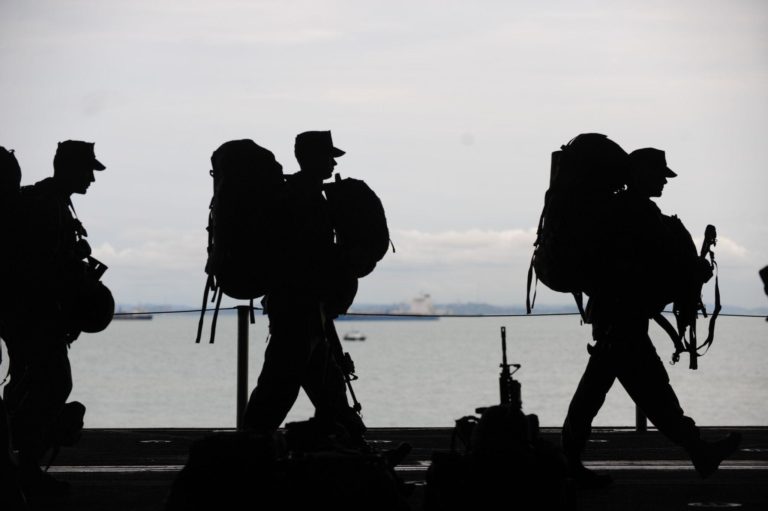If you are a civilian working overseas for a military contractor or subcontractor, the Defense Base Act or DBA may provide protection for you and your family if you are injured, killed, or disabled in the course of your employment. These frequently asked questions about the DBA will help you determine if you or a loved one is eligible for benefits under the Defense Base Act.
1. What is the Defense Base Act?
With a few exceptions, the Defense Base Act extends the protections of the Longshore and Harbor Workers’ Compensation Act (LHWCA) to individuals who work for U.S. government contractors overseas. These benefits include disability and medical compensation for eligible employees and death benefits to eligible survivors.
2. Who Is Covered by the Defense Base Act?
You are likely to be eligible for Defense Base Act coverage if you are injured traveling to or in the course of your employment and:
- You work for a private employer on a U.S. military base or land used for military purposes.
- You perform services under public work contracts or as part of the Foreign Assistance Act.
- Your work is performed overseas for a U.S. employer for the benefit of the Armed Forces.
3. When Does the DBA Not Apply?
You may not be eligible to submit a Defense Base Act claim if:
- You are covered under the Federal Employees’ Compensation Act.
- You are engaged in domestic service, agriculture, or other “casual” employment not related to your employers usual course of business.
- You are the master or crew member of a vessel where other legal protections may apply.
4. What Does “Public Work” Mean in the DBA?
Public work is defined as a project or operation under service contract that is connected with national defense or war activities. This often involves construction, repair, and demolition projects for improvements designed for the public use of the U.S. or its allies. If you were injured or developed a medical condition while working on this type of project, you may be covered by the Defense Base Act.
5. Who Handles Base Defense Act Claims?
The DBA is administered by the U.S. Department of Labor, which divides the country into three districts. If your claim for Defense Base Act coverage is denied or you believe you are not receiving the compensation you deserve for your injuries or disability, you should consider working with a maritime law firm that has experience handling Defense Base Act cases.
6. Where Should I File a DBA Claim?
The U.S. Department of Labor prefers that you fax a “case create” form to their fax number reserved specifically for creating cases: (202) 513-6814.
If you are unable to fax the DBA case creation forms, you may mail them to the Jacksonville office of the Division of Longshore and Harbor Workers’ Compensation. This office handles case creation for all three districts:
U.S. Dept. of Labor
Office of Workers’ Compensation Programs
Division of Longshore and Harbor Workers’ Compensation
Charles E. Bennett Federal Building
400 W. Bay Street, Room 63A, Box 28
Jacksonville, FL 32202
You may also use the Lonshore’s Secure Electronic Access Portal (SEAPortal) for electronic upload of documents to create a case or add digital documents to a case file.
7. What Are the Benefits Under the Defense Base Act?
If you are eligible for coverage under the DBA, you will qualify for:

- The right to choose your own doctor
- Medical benefits
- Disability benefits
- Death benefits to eligible survivors
8. How Is the Rate of DBA Compensation Determined?
The compensation paid to an injured employee under the DBA varies based on a number of factors:
- You are entitled to coverage for medical expenses and treatment by the doctor of your choice.
- Maximum disability benefits are equal to two-thirds of your average weekly wages.
- You are entitled to compensation for partial loss of earnings without total disability.
- Survivors of eligible employees receive death benefits, including reasonable funeral expenses and one-half of the average weekly earnings, sharing up to two-thirds if there is more than one eligible survivor.
- Total disability and death benefits include cost of living adjustments annually.
9. Do You Need to Be a US Citizen to Receive DBA Benefits?
No, the Defense Base Act covers foreign nationals who meet the eligibility requirements. In these cases, benefits may be paid as a one-time lump sum representing the present value of future compensation. Death benefits for non-citizens may only be paid to a surviving spouse, child, or dependent parent.
10. Is PTSD Covered Under the Defense Base Act?
Post-Traumatic Stress Disorder or PTSD is an injury that is eligible for coverage under the DBA. Providing evidence of psychological injury can make a claim more complex, and the injured person may not be diagnosed for months after the event. Many contractors fear losing their security clearance or their employment. Claims for PTSD under the DBA may require the help of an experienced attorney and may involve a trial to resolve contested claims.
11. Is There a Time Limit to File a DBA Case?
Under the DBA, you must report your injury within 30 days. In cases of an occupational disease that develops over time, including exposure to toxic substances or traumatic events, you may be able to file a claim for up to two years from the day you became aware of your illness or injury.
12. How Long Do Disability Benefits Continue with the DBA?
There is no waiting period to receive disability benefits under the DBA. Your employer has 14 days to begin issuing disability payments once they are notified about your disabling injury or illness. Benefits should continue as long as you are receiving medical care or are unable to work. The level of disability you endure will determine how long payments continue.
- TTD or Temporary Total Disability payments continue until you reach maximum medical improvement and are able to return to work.
- TPD or Temporary Partial Disability payments are paid if you are partially disabled but able to perform light-duty work while you are recovering.
- PPD or Permanent Partial Disability payments are ongoing if you have reached maximum medical improvement but are only able to work in a reduced capacity or different occupation.
- PTD or Permanent Total Disability payments are ongoing for those who are permanently disabled and will be unable to work again.
13. Do I Need a Lawyer to File a DBA Claim?
This is a very personal decision that should be based on the complexity of your situation and the severity of your injuries. In some cases, the injuries and long-term disability might be clear and your employer might begin paying full benefits promptly. However, all too often this is not the case, and injured contract workers are given limited options for medical care or their disability is minimized.

Having an advocate from the beginning of this process helps protect your rights to full and fair compensation under the Defense Base Act or other applicable maritime laws. Even if you are told you do not qualify for benefits under the DBA, you might be protected by the Jones Act, the LHWCA, or other federal regulations.
Our legal team at Maintenance and Cure has the experience you need to navigate these complex waters and receive the timely payments you deserve. As soon as you have received emergency medical care and reported your injuries to your employer, you can schedule a free consultation with our Defense Base Act attorneys. Reach out to us today to get the sound legal advice you need as you face a serious injury or death overseas.
Sources:



